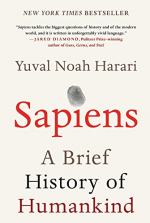
|
| Name: _________________________ | Period: ___________________ |
This test consists of 5 multiple choice questions, 5 short answer questions, and 10 short essay questions.
Multiple Choice Questions
1. Harari states that "the most unique feature of Sapiens language" (24) is that it provides its speakers with what?
(a) The ability to speak about fictions.
(b) The ability to solve complex problems.
(c) The ability to communicate about danger.
(d) The ability to use voice intonation.
2. Which name of a god is NOT listed among the leading deities of the Mesopotamian pantheon?
(a) Marduk.
(b) Enlil.
(c) Murabi.
(d) Anu.
3. What is NOT provided as an example of a full script?
(a) Latin script.
(b) The Hammurabi Code.
(c) Ancient Egyptian hieroglyphics.
(d) Braille.
4. Harari asserts that "Prior to the Cognitive Revolution, humans of all species lived exclusively" (63) where?
(a) On the Euro-Asian landmass.
(b) On the landmass of the Americas.
(c) On the Austral-Asian landmass.
(d) On the Afro-Asian landmass.
5. How does Harari define elements of society such as prisons and concentration camps?
(a) Republics.
(b) Cooperation networks.
(c) Phyla.
(d) Nations.
Short Answer Questions
1. Sapiens began to drive other human species into extinction and to take over the rest of the planet how long ago?
2. For what span of time did the "most durable human species ever" (6) survive?
3. What did NOT appear during the Cognitive Revolution?
4. Of what material was the lion-man figure made that was found in the Stadel Cave in Germany?
5. Harari names Sapiens' first achievement after the dawn of the Cognitive Revolution as what?
Short Essay Questions
1. What does the author state about the negative effects of agriculture on the human race?
2. What evidence does Harari provide for his conclusion that foragers had been better off than their counterparts living after the dawn of the Agricultural Revolution?
3. For what purpose does the author include a table at the start of the text that presents a timeline of human history?
4. How does the author emphasize his view that societal orders are imagined?
5. What examples does the author provide for his claim that societal orders are imagined, rather than objective?
6. Analyze Harari's use of the term “curtain of silence” (61) within his discussion of our limited understanding of human history.
7. Discuss Harari's suggestions regarding the use of humility when considering human history.
8. What call to action does the author make regarding the hierarchy cycle?
9. What is the author's definition of the word natural and how does he support his claim?
10. What evidence does the author provide for his claim that what is beneficial to the species as a whole is not always beneficial to individuals?
|
This section contains 1,352 words (approx. 5 pages at 300 words per page) |

|




